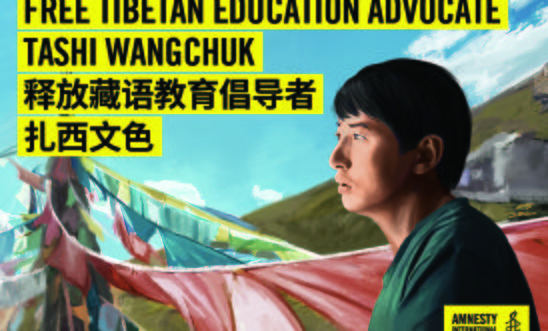
Press releases
China: Tibetan activist faces 15 years after appearing in New York Times film

Today’s trial of a Tibetan language activist, who could face up to 15 years in jail for “inciting separatism”, has exposed how ludicrously unjust the case against him is, Amnesty International has said.
According to his lawyer, the main evidence presented against Tashi Wangchuk was a short film produced by The New York Times in 2015, which documented his campaign for Tibetan language education in schools.
Mr Wangchuk, who has been in pre-trial detention for almost two years with no access to his family, is now awaiting the court’s verdict. The trial took place today at a court in the Yushu Tibetan Autonomous Prefecture in Qinghai province, northwest China.
Wangchuk is an advocate for increased Tibetan language education in schools in Tibetan-populated areas where Chinese has become the sole language of instruction. He has voiced his concerns that many Tibetan children are unable to use their native language fluently, which contributes to the gradual extinction of Tibetan culture.
Roseann Rife, Amnesty International’s East Asia Research Director, said:
“It is appalling that Tashi Wangchuk could face up to 15 years’ imprisonment simply for expressing his views in media interviews. These are blatantly trumped-up charges and he should be immediately and unconditionally released.
“Exposing and criticising the way Tibetan language and culture are being suppressed by government policies is a legitimate exercise of free speech. Labelling it as a form of ‘inciting separatism’ demonstrates how the Chinese authorities blatantly misuse this criminal charge to silence dissent.”
New York Times documentary
‘A Tibetan’s Journey for Justice’, produced by The New York Times in 2015, told the story of Wangchuk’s trip to Beijing to seek legal assistance in filing a lawsuit against local officials regarding the lack of Tibetan language education in schools. It revealed that no law firm was willing to take on the lawsuit and that the state-sponsored TV station, CCTV, refused Wangchuk’s request to report on the situation.
The police used the footage as evidence that he had deliberately incited “separatism”, supposedly by attempting to discredit the Chinese government’s international image and its policies on ethnic minorities.
Roseann Rife said:
“The video made by The New York Times shows that Tashi Wangchuk was trying to express his opinions about education policy through entirely legitimate means using official media and the Chinese legal system, but no-one was willing to touch such a sensitive subject.
“This case demonstrates the extreme discrimination Tibetans face in China today, especially in terms of the restrictions on the rights to freedom of expression and to use their own language.”
The trial took place shortly after Tibetan filmmaker Dhondup Wangchen was reunited with his family in the United States on 26 December, almost 10 years after he was first detained in China for making an independent documentary about the views of ordinary Tibetans ahead of the 2008 Beijing Olympics.